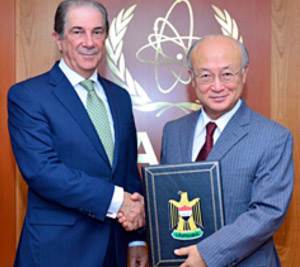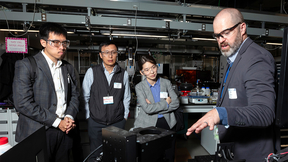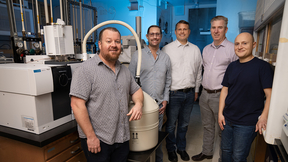Iraq strengthens commitment to safeguards agreement
 (Download Image)
(Download Image)
Iraqi Ambassador to Austria Surood Rashid Najib (left) has submitted an official letter from the Iraqi Foreign Minister to Yukiyo Amano, director general of the International Atomic Energy Agency (IAEA), that ratifies an Additional Protocol to Iraq's Comprehensive Safeguards Agreement.
For LLNL's Jonathan Essner of Global Security, this is excellent news. Essner led National Nuclear Security Administration's (NNSA) cross-lab -- Livermore, Oak Ridge, Argonne, Pacific Northwest and Brookhaven -- effort to assist Iraq in implementing the Additional Protocol, an important component of the nuclear nonproliferation regime administered by the IAEA. The letter was submitted in late October.
Ironically, the need for the Additional Protocol grew out of the post-Gulf War experiences in Iraq in the early 1990s, when a United Nations-established inspection regime discovered that Iraq had a clandestine nuclear-weapons program.
As a signatory to the Nonproliferation Treaty (NPT), Iraq's activities were forbidden and a significant violation of its safeguards agreement. According to Essner, Iraq was declaring its civilian nuclear activities, which the IAEA would routinely verify. But the IAEA had limited understanding of and authority to investigate the possible existence of undeclared activity. As the UN inspection team would uncover, "Iraq's declarations may have been correct, but they certainly were not complete," says Essner. The Additional Protocol aims to address this weakness in the safeguards regime by obligating countries that have ratified the treaty to declare specific nuclear-related activities and grant expanded access rights to the IAEA. Under the ratified protocol, Iraq has agreed to undertake these additional safeguards obligations.
In 2010, NNSA's International Nuclear Safeguards and Engagement Program (INSEP) responded to a State Department request to assist Iraq with Additional Protocol implementation. Iraq signed and agreed to provisionally implement the Additional Protocol in January 2010.
From 2010 through 2012, Essner's team led three training workshops: one in Amman, Jordan and two in Vienna, Austria, at the IAEA headquarters. Through the training, the cross-laboratory team assisted Iraqi counterparts from the Ministry of Science and Technology in developing and submitting declarations to the IAEA and understanding the breadth of the IAEA's access rights. "We worked with very capable, enthusiastic counterparts from the Iraqi government," Essner said. "And the success of this engagement speaks to the value of cross-laboratory collaboration. I enjoyed working with my laboratory counterparts and look forward to doing so again in the future.
While most countries now consider the Additional Protocol the standard in international safeguards, some NPT signatory countries -- Algeria, Egypt, Iran, and Syria, among others -- have not ratified it. Essner's work related to Iraq is now complete. He continues to lead the cross-lab effort that is working with Serbia -- part of the former Yugoslavia -- as it prepares to ratify the Additional Protocol.
Contact
Stephen P Wampler[email protected]
925-423-3107
Tags
Global SecurityStrategic Deterrence
Featured Articles







